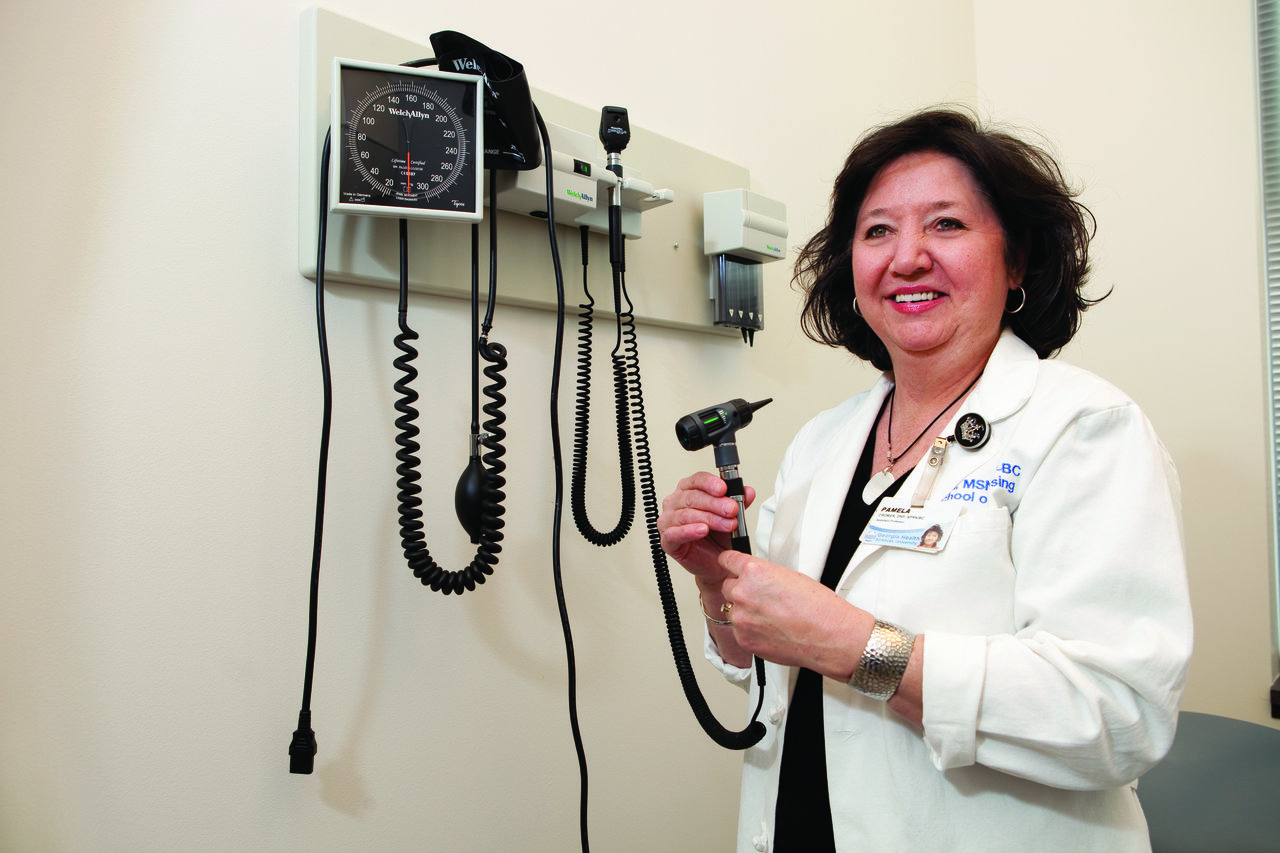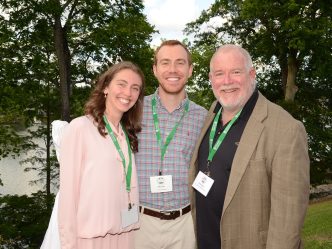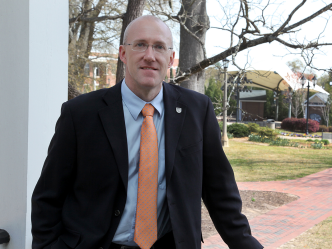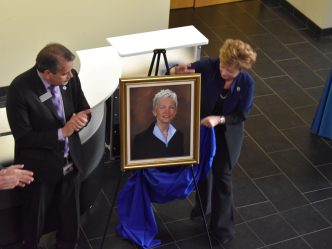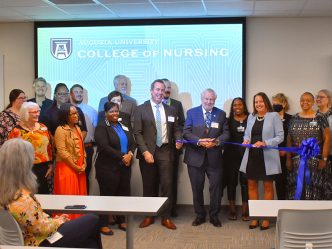When it launched in 2005, the Doctor of Nursing Practice program at GRU’s College of Nursing was one of few in the nation—and hasn’t stopped innovating yet.
By Danielle Wong Moores
Many people dream about becoming nurses. But not Lindsay Moore.
Moore didn’t even take any science classes during her time at Georgia’s Toccoa Falls College, instead double majoring in business administration and counseling with a double minor in outdoor leadership and education and Biblical studies. Her heart was for mission work, but hearts can be funny things. After college graduation, she worked for a relief organization in Gabon, Africa, alongside physicians and advanced practice nurses, and suddenly her heart changed. “We had a lot of good conversations about what they do, and nursing just seemed to fit,” said Moore.
But then there were those science classes—and the fact that Moore was eager to get back to the mission field as a nurse, not in 10 or more years but as soon as possible. All of which brought her back to Georgia and to the Georgia Regents University College of Nursing.
GRU offers an accelerated 16-month Clinical Nurse Leader program designed specifically for professionals interested in nursing, but who, like Moore, earned their degree in another field. While Moore still had to brush up on a few prerequisite classes in chemistry and biology, she was accepted and enrolled in the CNL program in 2010.
But Moore was looking beyond that. Her ultimate goal was to then enter GRU’s Doctor of Nursing Practice program and its acute care nurse practitioner option immediately after graduating as a CNL.
Moore in fact would become the first GRU nursing student to go straight through from the CNL to the DNP program—heralding a sea change in how nursing education is being delivered at GRU and serving as a model for other nursing programs who are watching GRU’s innovations closely.
The DNP Difference
This year marks the 10th anniversary of the College of Nursing’s DNP program—which was one of just 10 in the nation when it launched in the summer of 2005. For nursing dean Dr. Lucy Marion, launching the program was a prerequisite of her accepting the dean’s position at GRU (then named the Medical College of Georgia).
“We knew it was going to be the future,” said Marion. She recently had served as president of the National Organization of Nurse Practitioner Faculties, and the data crossing her desk revealed that nurse practitioner students were spending considerably more classroom and clinical hours to learn what they needed—approaching doctoral levels. “We saw that, and we said, ‘Something’s happening here,’” said Marion.
That “something” was a knowledge explosion in health care due to a rapidly changing health care environment, coupled with a growing nationwide shortage of primary care physicians and limits to resident physician hours. Nurse practitioners had been stepping up to fill the gap, providing primary care and ensuring care coordination and patient education, all while still holding the patient’s hand during tough times.
A handful of institutions, including Columbia University, were already responding to these changes with their own version of a DNP program, and Marion connected with all four. “That’s when I had an a-ha moment,” she said. “I went to a board meeting after that and said, ‘Folks, this is going to happen, and it’s going to happen big.”
Marion left that meeting with a commitment by the organization to support the development of DNP programs for advanced practice nurses—and three years later she was laying the groundwork for a new DNP program at GRU.
The program was launched after just nine months of planning under the leadership of Dr. Sandy Turner, FNP—“It was rough, very rough, but we pushed it through,” said Marion—with a first class made up entirely of GRU nursing faculty members. Fourteen in all, with 11 graduating, they would serve as a test class to help improve and refine the program.
Marguerite Murphy was one of those students. Then director of the RN to BSN program, Murphy would become director of the DNP program in 2008. “There’s a strong sense of history and a strong sense of pride in being part of the original class,” she said. “We were on the cutting-edge of this DNP movement, and to see where it’s gone and the difference that it has made—it’s been exciting.”
The program has changed rapidly over the past decade. Originally simply a post-masters DNP, acute care nurse practitioner was the first concentration added to the degree, followed by family nurse practitioner and pediatric nurse practitioner. By fall 2016, the plan is to add mental health, nurse anesthesia and nurse executive concentrations, and later, public health.
What hasn’t changed is how the DNP takes nursing to the next level. “To be effective moving forward, advanced practice nurses need to be able to look at the research and decide if they should use it to change their practice,” said Murphy. “They need to be able to understand health care policy and how policies impact care and care delivery to effectively advocate for their patients and for themselves.”
The DNP candidates get an early taste of how they can make a real difference—or as Murphy describes it, “have an equal seat at the table.” Each candidate must complete a final project, which gave Murphy, as a student, the opportunity to work alongside national nursing leaders to develop a multidisciplinary evidence-based guideline to prevent post-operative nausea and vomiting, while Moore proved the effectiveness of video discharge instructions for sickle cell patients—a program that is now being adopted in that clinic and others at GRHealth.
The Future of Advanced Practice Nursing
Marion’s prediction of DNP programs “happening big” was accurate. Today there are more than 250 DNP programs nationwide—and GRU’s program alone has graduated 143 DNPs since its inception, with another 10 expected this May.
But the program isn’t simply resting on its laurels. In 2010, the Institute of Medicine released a report—“The Future of Nursing: Leading Change, Advancing Health”—that, among other things, urged nursing schools to improve their educational systems so that nurses could achieve higher levels of training and education with seamless academic progression, not the least of which was to double the number of doctorally prepared nurses by 2020.
The IOM recommendations were groundbreaking. Nursing culture has always dictated that becoming an advanced practice nurse required earning a degree, stopping to get two or more years of experience, then going back for another degree and so on. The result is that advanced practice nurses are often in their 40s or 50s before they earn a doctoral degree—in contrast to physicians and other health care providers—and miss out on years of productivity where they could have advanced the practice of nursing as DNPs.
Under Marion’s leadership, the seamless transition of nurses from masters to doctorally prepared in about four years compared to 20 has long been another vision of the College of Nursing. It was achieved last year through Moore’s graduation from the DNP program, and about five other CNLs are set to do the same in the next three years, having entered the DNP program this past spring. “This year, the program reached the tipping point,” said Marion. “We know we’re there.”
For Moore, who graduated in May 2014 and is now a nationally certified Adult and Geriatric Acute Care Nurse Practitioner, her four years of study were challenging, informative, exhilarating and enlightening. During her DNP program, she worked as an ER nurse and is continuing to do so as a nurse practitioner, all while pursuing an international medicine fellowship before she returns to the mission field. “I wouldn’t have done it any other way,” she said.
Her DNP training is already helping her move the practice of nursing forward through evidence applied at the bedside—a skill she will rely on when she is overseas working to care for patients with limited resources. “Becoming a nurse … It was a good decision,” she said with a smile. “I love it, I really do; and I’m excited to finally be able to apply all this preparation, all this training for people who need urgent and emergent health care.”
 Augusta University
Augusta University
